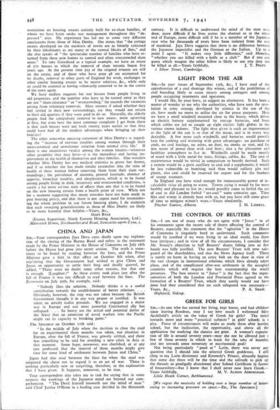LIGHT FROM THE AIR
SIR,—In your issues of September 15th, &c., I have read of the apprehension of a coal shortage this winter, and of the prohibition of coal hoarding likely to cause misery among cottagers and among people occupying tenements and mansions.
I would like, by your leave, to suggest an alternative. It has been a matter of wonder to me why the authorities, who have seen the revo- lution in army strategy developed by science in the use of the air, have made no move to utilise the air for peace purposes. Here we have a small windmill mounted close to the house, which drives an electric battery supplemented by storage batteries, and from which cables are led to couple up eight electric light . globes in the various rooms indoors. The light thus given is suck an iMprovement as the light of the sun is to that of the moon, and is in every way desirable. A few more such windmills and batteries would provide heat for cooking and warming with great advantages: no purchase of coals, no coal haulage, no ashes, no dust, no smoke or soot, and far less waste of power than with coal fires ; also a far pleasanter and healthier atmosphere to live in. Windmills could be made mostly of wood with a little metal for axles, fittings, cables, &c. The cost of maintenance would be trivial in comparison to benefit derived. Such a system would be a great auxiliary to coal and a supplement; it would be less vulnerable to bombing raid than would colliery pits and plants, also coal could be reserved for export and for the bunkers of tramp steamers.
In England you have wind enough for immeasurable power of in- calculable value all going to waste. Towns using it would be far more healthy and pleasant to live in ; would possibly come to forbid the use of coal as did London forbid " sea-coal " some centuries ago. Time flies and winter is already here with us, but you have still some grace of time to mitigate winter's woes.—Yours obediently,






















 Previous page
Previous page